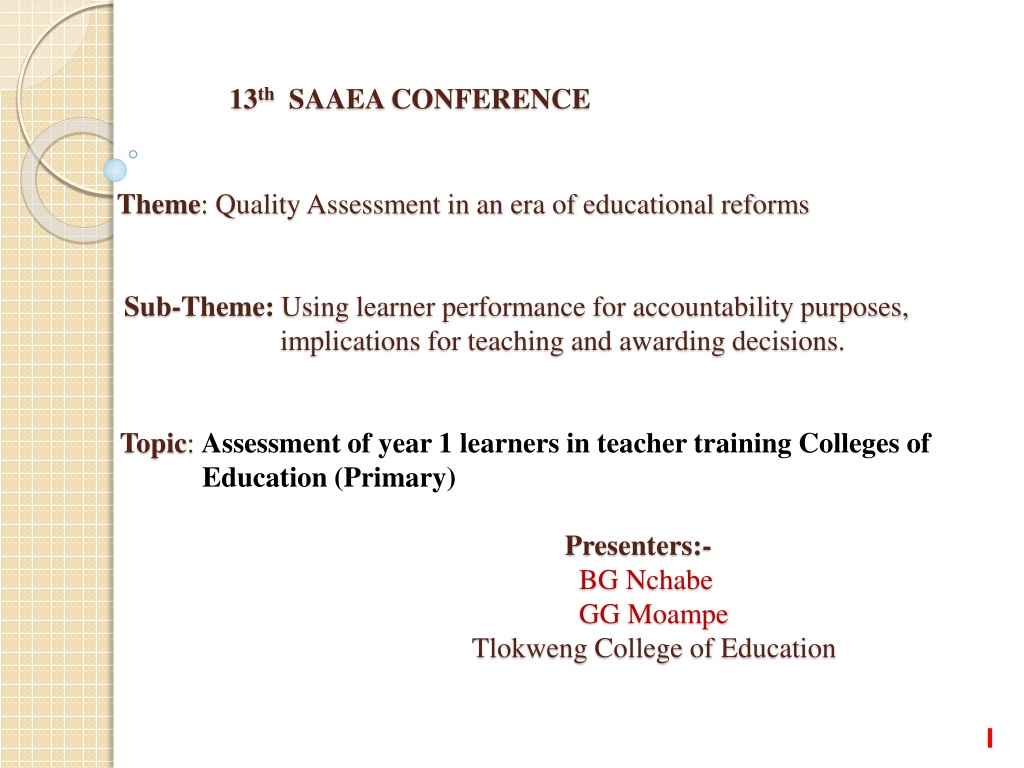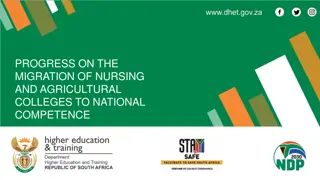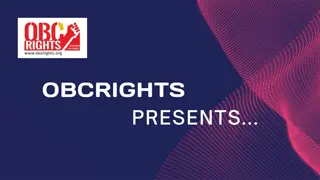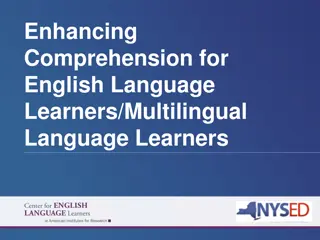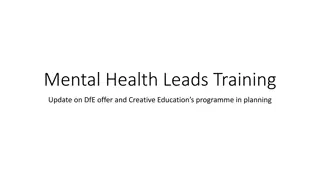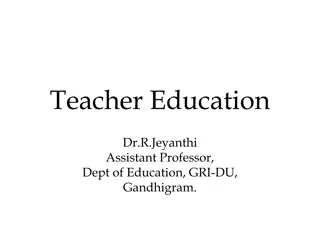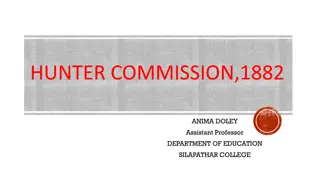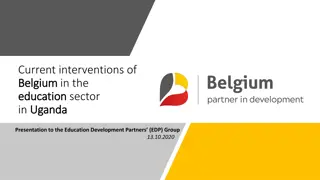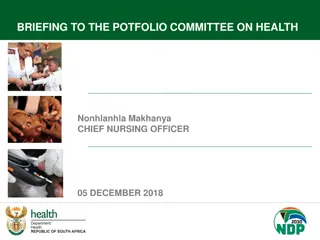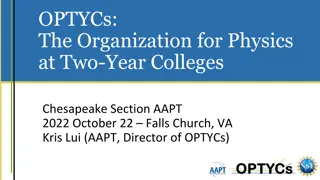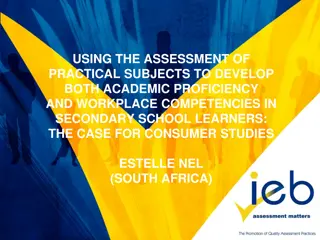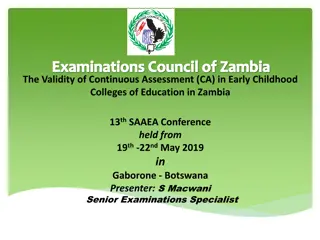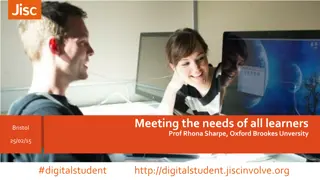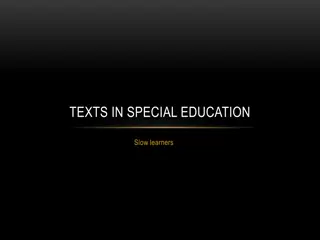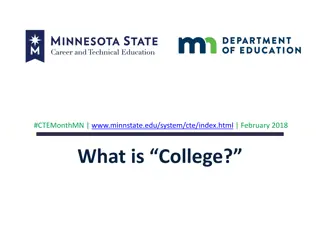Assessment of Year 1 Learners in Teacher Training Colleges of Education (Primary)
This presentation focuses on the assessment of Year 1 learners in Teacher Training Colleges of Education (Primary), discussing issues such as the suitability, reliability, and fairness of assessments. It covers aspects like the background information, methodology, results, and recommendations for improving the assessment system to ensure better student outcomes.
Download Presentation

Please find below an Image/Link to download the presentation.
The content on the website is provided AS IS for your information and personal use only. It may not be sold, licensed, or shared on other websites without obtaining consent from the author. Download presentation by click this link. If you encounter any issues during the download, it is possible that the publisher has removed the file from their server.
E N D
Presentation Transcript
13thSAAEA CONFERENCE Theme: Quality Assessment in an era of educational reforms Sub-Theme: Using learner performance for accountability purposes, implications for teaching and awarding decisions. Topic: Assessment of year 1 learners in teacher training Colleges of Education (Primary) Presenters:- BG Nchabe GG Moampe Tlokweng College of Education 1
Presentation outline a) Introduction b) Background information c) Literature review d) Methodology e) Results and discussion Conclusion f) g) Recommendations 2
Introduction Assessment Suitable, trustworthy, reliable and fair Interpretation of the assessment results Any form of assessment that is not well sought of may lead to poor decision making about the learner achievement (BEC, 2018). According to Education and Training Sector Strategic Plan 2015-2020 (ETSSP) teacher education programme and its assessment system needs to be reviewed so that is more competency based. 3
Background Information The DPE programme 1. English & Setswana 2. Math &Science 3. R/Education & S/Studies 4. Any two from Practical subjects Course structure at Year 1 The current DPE Academic Regulations requirements 4
Problem Statement 2014/15 Intake Subject s opted for on admissions Subject s failed in Year 1 Candidate Final status Agriculture & Home Economics English Completed a year after the normal duration Religious Education & Social Studies English Home Economics Withdrew Religious Education & Social Studies Math, Science Agriculture Withdrew 5
Problem Statement cont 2015/16 Intake Subject s opted for on admissions Subject s failed in Year 1 Candidate Final status English & Setswana Mathematics Re-admission was due 2018/19 but never turned up. (F&D) English & Setswana Mathematics (F&R) Now in year three, had to repeat Year 1 English & Setswana Mathematics, Science Agriculture Physical Education (F&R) Has been twice unsuccessful in the programme. (Fail & Exclude) 6
Problem Statement cont 2016/17 Intake Subject s opted for on admissions Subject s failed in Year 1 Candidate Final status Art & Music Mathematics Now in year 2; Has Repeated Year 1 (F&R) Religious Education & Social Studies Mathematics (F&R) Now in year 2; Has Repeated Year 1 Agriculture & Home Economics Science (F&D) Was to be re-admitted into the programme after lapse of one year; never turned up. 7
Problem Statement cont 2017/18 Intake Subject s opted for on admissions Subject s failed in Year 1 Candidate Final status English and Setswana Music (Sup) Progressed to year 2 after supplementing Physical Education & Home Economics Music (Sup) Progressed to year 2 after supplementing Physical Education & Home Economics Music (Sup Progressed to year 2 after supplementing. Religious Education & Social Studies Music (Sup) Progressed to year 2 after supplementing 8
Purpose of the study 1) What are your views whereby progression to year 2 of the DPE programme is based on the results for non-specialization area ( Foundation subjects)? 2) At what stage of the DPE programme should candidates indicate areas of specialization? 3) In your view what should the curriculum in year 1 of the DPE programme focus on? 9
Literature Review Assessment in Finnish Teacher College of Education focuses on pedagogical knowledge. a) Classroom Teacher: Focus on lower grade teaching ( 1-6) Trained to teach all subjects relevant for the classes they handle . b) Subject Teacher: Focus on upper grades (7-9). Specialises in one or two subjects (major and minor) but they teach only one subject at school level. For both teachers the curriculum is mainly on pedagogical studies, ICT, research, and relevant content. ( Halinen, 2018; Chang & Tsuruta, 2010; Dobbis &Martens, 2012; Sahlberg, 2010) 10
Literature Review cont Focus of Teacher Education in Pakistan (Gopang, 2016) Professional skills Pedagogical content knowledge Use of technology in the classroom Curriculum design A study by Darling-Hammond (2006) showed that teacher education in America focuses mainly on : Pedagogical content knowledge Classroom management Use of technology in the classroom Effective communication 11
Methodology In order to find out the validity of the form of assessment for year 1 DPE programme the researchers embarked on a qualitative study. The study targeted both lecturers and current year 2 leaners in Tlokweng College of Education. The sample consisted of fifteen lecturers and thirty five students. a) b) c) Candidates sample from 2017/18 Intake Candidates area of specialization Number per Gender Female 4 3 4 1 1 1 1 1 2 18 Male Total English/Setswana Mathematics/Science Religious Education/Social Studies Art/Home Economics Art/ Music Art/Physical Education Agriculture/Home Economics Agriculture/ Music Agriculture/Physical Education 3 4 3 1 1 2 1 1 1 7 7 7 2 2 3 2 2 3 Totals 17 35 12
Data Collection and analysis Both lecturers and students were subjected to group interviews. a) Trainees Groups: Math/Science; English/Setswana; Religious b) Education/Social studies; Agriculture and Art. Lecturers were grouped according to gender; thus eight female and c) seven male. The interviews lasted for thirty minutes per group and the researchers d) transcribed the responses. Thereafter the responses were read to the group for confirmation, e) correction and or additions. To analyze data, similarities in responses were considered and words f) used for elaboration. 13
Findings Teacher Trainees Interviews: All those teacher trainees who participated for this study agree that:- specialization should be indicated on admission to the college. a) Pass mark for progression should be 50% . b) For non-specialization area, only professional studies should be the c) focus of the curriculum No learner should repeat /discontinued /excluded from the programme d) due to failed content on non-specialization courses. 14
Findings cont(Some quotes from teacher trainees ) 1. What are your views whereby progression to year 2 of the DPE programme is based on the results for non-specialization area (subjects) of year 1? Progression should be on areas of specialization only not everything, the Regulation that make us fail should be deleted completely It is really unfair and uncalled for to fail a learner on something that he had never wanted to do from the onset. I would understand if I fail what I indicated to do, not something that I never liked even at Cambridge, the Regulation being applied is not good at all . I hate mathematics, to be taught about advanced algebra that I will not even teach at primary school is not a good thing. Like now I supplemented year 1 examinations, it s by God s grace that I progressed and I believe it is because of professional studies, not content; the Regulations are hard on us. 15
Findings cont 2. At what stage of the DPE programme should candidates indicate their areas of specialization? Elaborate whatever answer you provide. Specialization should start straight away from year 1 so that we are well prepared in our areas of specialization Year 1 and let it be actual specialization as indicated in the advert, not all subjects specialization Year 1, but I hate other subjects that I did not choose, they destructed me on what I wanted to focus on as I spent much time cramming so that I should not supplement or fail. Thank God I made it 16
Findings cont 3. In your view, what should be the curriculum in year 1 of the DPE programme focus on? Elaborate on your response. I don t know, lecturers should know better what makes us better teachers, but not difficult subject contents. What I am only sure of is that I want to be a quality teacher who can compete globally, what content or focus of the curriculum make such kind of a teacher, I am really not sure, but I think is not difficult subject matter from all areas that we are currently taking. I am not sure but I think the curriculum should be more on how to teach the content offered at primary school since we are going to teach at that level. I just want to focus on my specialization, nothing else, we are tired of failing 17
Findings contLecturers Interviews All the fifteen lecturers seem to acknowledge that:- a) the nature of the curriculum in year I disadvantages learners and need to be reviewed. b) the progression pass mark be maintained as of 50% in the subject . c) the Academic Regulations is also fine , that is learners should not score below 50% in a subject. d) Teacher trainees should focus on how to teach the subjects they are not specialising in and write the professional studies examination. 18
Findings cont(Some quotes from lecturers) 1.What are your views whereby progression to year 2 of the DPE programme is based on the results for non-specialization area (subjects) of year 1? The results interpretation is fine; the problem is the content of the curriculum for such candidates. There is need for Colleges of Education (primary), to ensure fairness when assessing learners. We see that the curriculum is not fair on learners but there is nothing we can do for now . (M) Using results for progression to year 2 is not a problem; the problem is what the candidates are subjected to that makes the results and decisions made to be unfair to candidates. The current curriculum does not take into consideration the individual learner s, needs and consents, but this will go on until it is reviewed and structured properly. (F) We have a certain forced and prescribed form of content to teach and assess and we have to comply and meet those requirements, there s nothing we can do for now. (M) As long as the curriculum and the Academic Regulations have not changed, candidates will continue to be subjected to examinations in content and professional studies of each subject areas. (F) 19
Findings contLecturers Interviews 2. At what stage of the DPE programme should candidates indicate their areas of specialization? Elaborate whatever answer you provide. Specialization should start in year 1 and learners should only do the content of their area of specialization, non-specialists should be trained on how to teach topics of subjects in a primary school syllabus (F) There is nothing wrong in indicating specialization in year one, but all is wrong to teach non-specialists the content of the subject they did not opt for, why can t Colleges of Education focus on professional studies for these candidates? (F) The current procedure is fine, the problem is the nature of the curriculum content for non- specialists candidates. Why do we bother them with content of the subject they did not want to specialize in? Why can t we be concerned with whether they will be able to teach all subjects in the primary school syllabus effectively? (M) Indicating specialization area when they are admitted is okay, the problem we are currently faced with that we need to challenge is relevance of the curriculum for these learners (M) 20
Findings contLecturers Interviews 3. In your view, what should be the curriculum in year 1 of the DPE programme focus on? Elaborate on your response. I think professional studies content is enough for non-specialists candidates. (F) Obliviously we want these students to teach effectively in primary schools, then why don t we just concentrate on that and forget about content studies? (M) We should be mainly concerned about how to teach specific subjects in primary schools and also holistically look at issues of classroom management; use of ICT in the classroom, lesson presentation, schemes of work and lesson plans, production of learning aids, evaluation and self-reflection. (F) I think each department should focus on how to teach that subject at primary school and this will be an effective way of training a generalist teacher for primary school teaching (M) We thought semesterised curriculum would be the solution, but the idea died a natural death , we are just waiting for anything. (M) 21
Conclusion The main purpose of this study was to seek views of both lecturers and teacher trainees regarding assessment in year 1 of the DPE programme in order to make informed recommendations for implementation. However, referring to the reviewed literature and the comparison of the actual situation in Colleges of Education (Primary) such as Tlokweng the researchers conclude that it seems as if the overall judgments based on the results of non-specialization subjects are biased since the needs and consents of candidates are not taken into consideration, and as such they are likely to be disadvantaged. 22
Recommendations 1. Review the current Colleges of Education programme to accommodate professional learning curriculum. 2. Year 1 teacher trainees should only do the professional component of the subjects they are not specializing in. 3. Progression for non-specialization area should be based on coursework and an examination for professional studies only, which focus on how to teach content of different subjects at primary school level. 4. There is need for review of assessment for year 1 learners in Colleges of education (Primary). 5. The same study be extended to Serowe College of Education 23
References cont Darling-Hammond, L. (2006). Constructing 21st century teacher education. Journal on Teacher Education, 57(10), 1-15. Gopang, I. B. (2016). The teacher education and professional development programs in Pakistan. The international of research on teacher education, 7(1),1-14. Korthagen, F.(2011). Making teacher education relevant for practice. The pedagogy of realistic teacher education. Orbis Scholae, 5(2),31-50. Maaranen, K.(2018). The Finnish teacher education. University of Helsenki: Faculty of Educational Sciences. Republic of Botswana. (2017). Botswana Qualification Authority criteria and guidelines for accreditation of learning programmes. Gaborone: Government Printers 24
References Republic of Botswana. (2016). Vision 2036: Achieving prosperity for all. Gaborone: Lentswe la lesedi (Pty) Ltd on behalf of the Vision 2036 Presidential task team Republic of Botswana. (1994). Revised National Policy on Education. Gaborone: Government Printers. Republic of Botswana.(2014). Education and Training Sector Strategic Plan. Gaborone:Ministry of Education and Skills Development. Sahblberg, P. (2010). The secret of Finland success: Educating teachers. Stanford: Centre for opportunity in education ------ (2018). Issues and options paper: A context paper used to inform development of national assessment policy for general education. Gaborone: BEC 25
Thank you for your valued attention. 26
